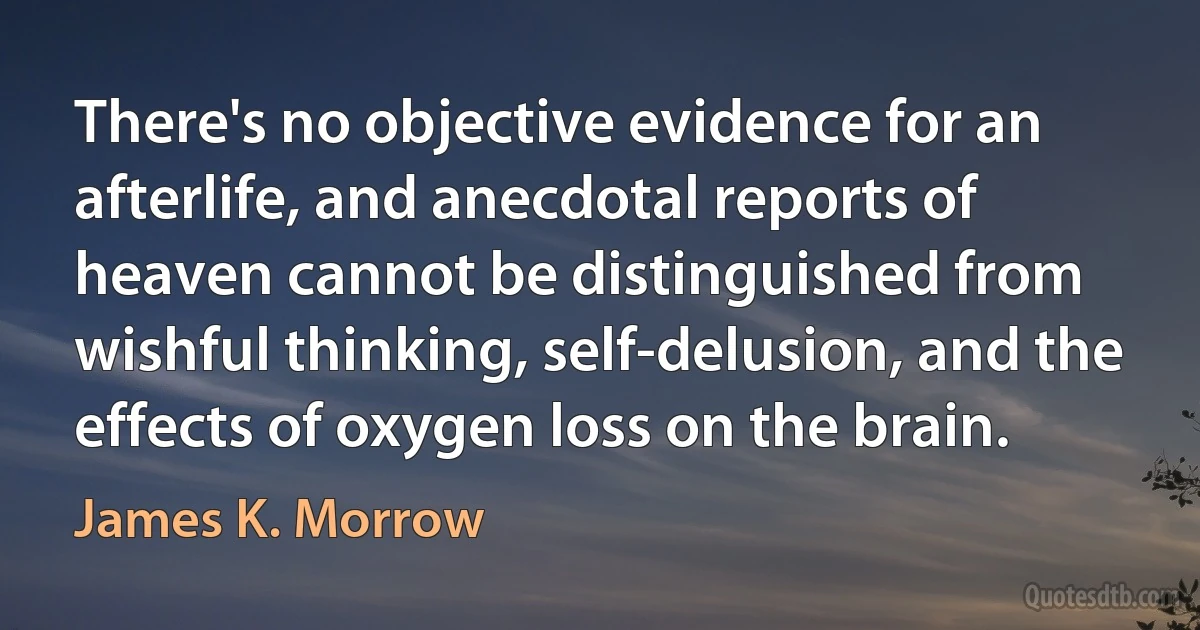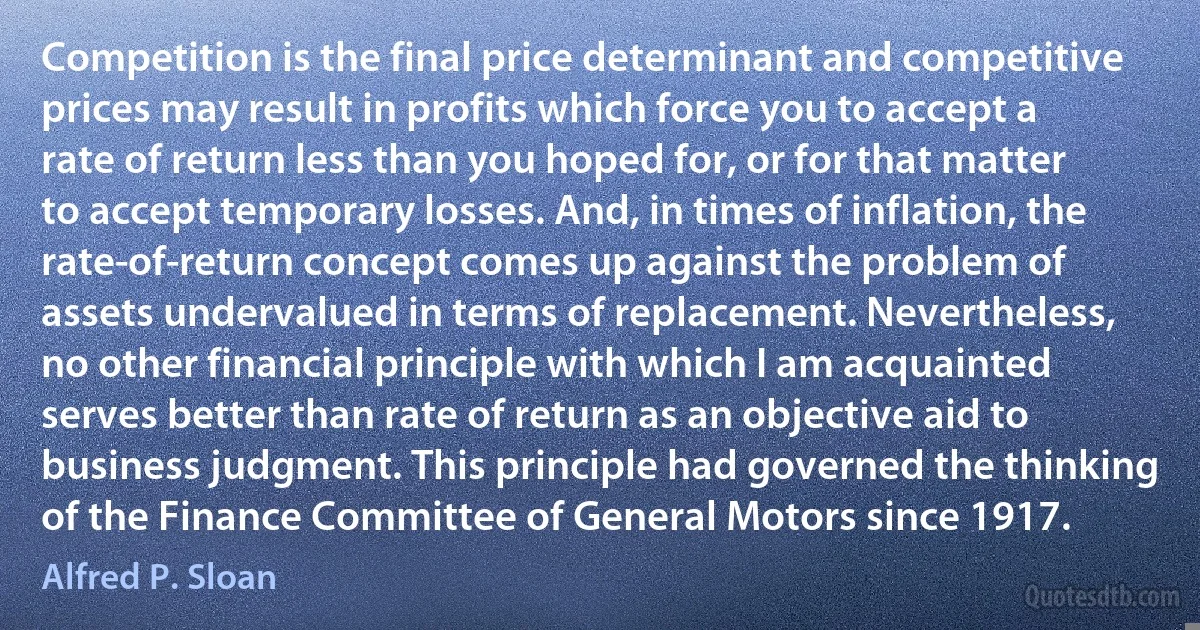Objective Quotes - page 22
The notion of a steady state has meant different things at different times in history. To the traditional or classical economist, the steady state takes the biophysical dimensions of the planet - including population and available resources - as given and adapts technology and tastes to these objective conditions.

Herman E. Daly
Science, it is usually believed, helps us to build a picture of objective reality – the world 'out there'. With the advent of the quantum theory, that very reality appears to have crumbled, to be replaced by something so revolutionary and bizarre that its consequences have not yet been properly faced.

Paul Davies
Why so negative?' says the spider to the fly. 'Be objective, forget your prejudices'. But there is no way the fly can be objective, however much she may want to be: 'to look at the web objectively, from the outside - what a dream', muses the fly, 'what an empty, deceptive dream'.... Any study of the web that does not start from the fly's entrapment in it is quite simply untrue.

John Holloway
Before the Treatise, the interest- rate was determined by tastes and objective circumstances, by the persuasibility of income-earners to transfer consumption from the present to the future, and the desire of business men to transfer the means of free enterprise from the future to the present, thus altering the productive possibilities and enlarging the prospective income of the society including themselves.

G. L. S. Shackle
I said consistently throughout that we need to get control of our borders and the only way to do that is to leave the European Union... Once we do that we are in a much stronger position to achieve that objective of bringing down migration to tens of thousands within this Parliament - I will stand by that.

Iain Duncan Smith
In the emerging picture of mankind in the universe, the future (if it exists) will surely entail discoveries about space and time which will open up whole new perspectives in the relationship between mankind, mind, and the uni-verse.... But what is now? There is no such thing in physics; it is not even clear that ‘now' could ever be described, let alone explained, in terms of physics.... Notions such as ‘the past,' ‘the present' and ‘the future' seem to be more linguistic than physical.... There is no universal now, but only a personal one-a ‘here and now.' This strongly suggests that we look to the mind, rather than to the physical world, as the origin of the division of time into past, present, and future....There is none of this in physics.... No physical experiment has ever been performed to detect the passage of time. As soon as the objective world of reality is considered, the passage of time disappears like a ghost into the night.

Paul Davies
Europe is not really even a geographic entity; it is separated from Asia only at one point, the Bosphorus, by a small stretch of water. North of that there is continuity over the russians steppes, a complete terrestrial flow. I suggest that is also true of culture, and indeed of social organization. Indeed Europe has never been purely isolated, purely Christian. Instead of Christian Europe, one has to see the continent as penetrated by the three world religions that originated in the Near East and which indeed had a common mythology or sacred text; in order of arrival these were Judaism, Christianity and Islam. (...) All have equal entitlements to be present, and in this general ('objective') sense none can be considered only as the Other; they are part of Europe, part of our heritage.

Jack Goody
Our adversaries have a determination which has existed since at least 1954 to absorb South Vietnam into a Communist state against the will of the vast majority of the people in the South and to rule that state from Hanoi. It is a simple, straightforward objective, no ifs or ands about it. They also have collateral objectives which in the long run may be equally as important to us, such as their desire to demonstrate the invincibility of the "War of Liberation" and in the end to evict the United States from Southeast Asia.

Maxwell D. Taylor
Much of social science has been built as a citadel against metaphysics and politics. Faithful to the outlook produced by the modern revolt against ancient philosophy, the classic social theorists were anxious to free themselves first from the illusions of metaphysics, then from the seeming arbitrariness of political judgments. They wanted to create a body of objective knowledge of society that would not be at the mercy of philosophical speculation or political controversy, and, up to a point, they succeeded. But now we see that to resolve its own dilemmas, social theory must again become, in a sense, both metaphysical and political. It must take a stand on issues of human nature and human knowledge for which no "scientific" elucidation is, or may ever be, available. And it must acknowledge that its own future is inseparable from the fate of society.

Roberto Mangabeira Unger
At the time of Indian independence, I was a student in London and we the students, Indian students, celebrated the moment with great joy. I was exhilarated, no doubt, but the shadow of two events fell upon the jollifications. First, a sense of disappointment that the imperialist objective of dividing India has been achieved. And second, the communal carnage which took place in India cast another shadow on it.

K. R. Narayanan
As a matter of fact, these attributes are their fate, no longer separate objects they can carry.... part of their actual presence. I try to signify this by reorganizing the objective form of such a legendary figure so as to create an allegorical form that is complete in itself, no longer requiring an attribute that must be carried like the German businessman's briefcase; the lyre becomes part of the poet's presence, its text written all over his body, as if tattooed on his skin.

Ossip Zadkine
Panini's grammar is the earliest scientific grammar in the world, the earliest extant grammar of any language, and one of the greatest ever written. It was the discovery of Sanskrit by the West, at the end of the 18th century, and the study of Indian methods of analyzing language that revolutionized our study of language and grammar, and gave rise to our science of comparative philology ... The study of language in India was much more objective and scientific than in Greece or Rome. The interest was in empirical investigation of language, rather than philosophical and syntactical. Indian study of language was as objective as the dissection of a body by an anatomist.

Pāṇini
So it is obvious that at first glance there would seem to be a paradox: the more we immerse ourselves in ourselves, the more open we become, since the closer we get to the germ of our totality the closer we are to the germ of totality of all men. We can therefore say that subjective invention is the only means of discovering objective reality, the only means that gives us the possibility of communication between men.

Piero Manzoni
He has no serious interest whatsoever in politics. He was compelled to make some political statements, a while ago, to achieve a particular purpose. I would not like to specify more on this particular issue. Now that he has achieved that objective, he has no further interest in politics. We have advised him to steer clear of politics. If you want to help people, we advised him, please do it as an individual, not as a politician.

Rajinikanth
Of course, there have been myriad conceptions of God since the dawn of civilization. There are the Abrahamic conceptions of God, including the monotheistic God of Judaism and the trinitarian God of Christians. In Buddhism, God is almost non-theist. In fact, conceptions of God vary so widely there's no clear consensus on the definition of God. In short, believers believe God has an incorporeal (immaterial) existence, and that there's an afterlife...According to biocentrism, a new "theory of everything,” the material and immaterial worlds are co-relative. Life and consciousness represents one side of the equation, matter and energy the other. They can't be divorced; split them and the reality is gone. Although the current scientific paradigm is based on the belief that the world has an objective observer-independent existence, a long list of experiments shows the opposite.

Robert Lanza
The ‘Digital India' initiative is one of the key measures to make government transparent, responsive and citizen friendly. The objective is to create a digitally empowered society and infuse technology into government, healthcare and education. From creating infrastructure to services, from manufacture of products to human resource development, from enabling citizens to promoting digital literacy, ‘Digital India' aims to impact all aspects of life in India.

Sushma Swaraj
The organism-in isolation nothing but a separate pole of "meaningless" subjective processes-becomes a Self by embarking with others upon the construction of an "objective" and moral universe of meaning. Thereby the organization transcends its biological nature.
It is in keeping with an elementary sense of the concept of religion to call the transcendence of biological nature by the human organism a religious phenomenon. As we have tried to show, this phenomenon rests upon the functional relation of Self and society. We may, therefore, regard the social processes that lead to the formation of Self as fundamentally religious.

Thomas Luckmann
The laws of nature, as analyzed mathematically and descriptively by Ptolemy and Galen, bore an interesting, and perhaps not entirely accidental similarity to the law of nations and of nature, as discerned by a long succession of Roman jurists. ...The concept of an objective law applicable to human affairs, yet operating in accord with Nature and Reason and apart both from divine revelation and from human whim or passion, was peculiar to Rome and societies descended from Rome.

William H. McNeill
It should be remembered that the pharmacologic treatment of raised farm animals can cause damage to the health of anyone who eats their meat. For example, the antibiotics that are legally added to animal feed-with the objective of preventing infections-can cause a resistance to antibiotics in humans. That is to say, a selection of bacterial strains resistant to antibiotics can be transmitted from animals to man through food; and can thereby generate infections difficult to stop.

Umberto Veronesi



